- Mauritius’ annulment of AFRINIC’s June 2025 election violates the Companies Act and undermines member authority.
- External support for the September rerun risks entrenching state capture and eroding Africa’s bottom-up Internet governance.
Decentralised member control: Ideal model and its vulnerabilities
In principle, AFRINIC’s governance is designed to be strongly decentralised. Its members—network operators, ISPs and other internet community organisations—nominate and elect board representatives, while an Election Committee oversees the process. The board is accountable to the membership community. This bottom-up model is meant to guarantee that policy and leadership decisions remain in the hands of those who actually use and manage Africa’s IP resources.
Yet this structure has critical weaknesses. Years of governance disputes, unclear election standards and weak dispute-resolution mechanisms have created gaps that allow external pressure to take hold. Without robust legal safeguards or judicial clarity, decentralisation becomes vulnerable to political interference. The 2025 board election highlighted these flaws. The June vote was conducted under court supervision and broadly judged to be free and fair, with proxy ballots accepted and wide member participation. Nevertheless, the Mauritian government instructed the court-appointed receiver to annul the result. This episode illustrates that even a member-driven system can be hollowed out if legal protections and clearly defined boundaries are absent.
Also read: AFRINIC’s September elections were a flagrant violation of its own bylaws
Also read: How AFRINIC can rebuild confidence after election dispute
Centralisation by state orders: A dangerous precedent
When a government or its appointed receiver cancels an election, restructures the process or assumes direct control, the centre of power shifts away from the membership. Such centralisation contradicts AFRINIC’s status as a member-based non-profit. Mauritius’ order to discard the June 2025 result lacks a solid basis under the country’s Companies Act and bypasses the court’s own oversight. It represents unconstitutional state capture, not democratic reform.
External actors have compounded the risk. By supporting the Mauritian government’s manoeuvres, the United States and others expose a double standard—calling for transparency and democracy while endorsing political interference in a non-profit election. At the same time, Kurt Lindqvist has released a new document linked to ICP-2 that quietly grants ICANN expanded powers to derecognise Regional Internet Registries. This move, though presented as a technical update, gives global bodies leverage to unsettle Africa’s bottom-up governance model. If one government can override a court-approved election, others may follow, undermining trust across the entire Internet numbering system.
To restore credibility, AFRINIC must reaffirm the June election results, fortify its legal safeguards and keep member control at the heart of African Internet governance. The results of the September election should not be recognized. Only by resisting political capture and external power plays can Africa’s IP resource management remain truly independent and accountable to its own community.

